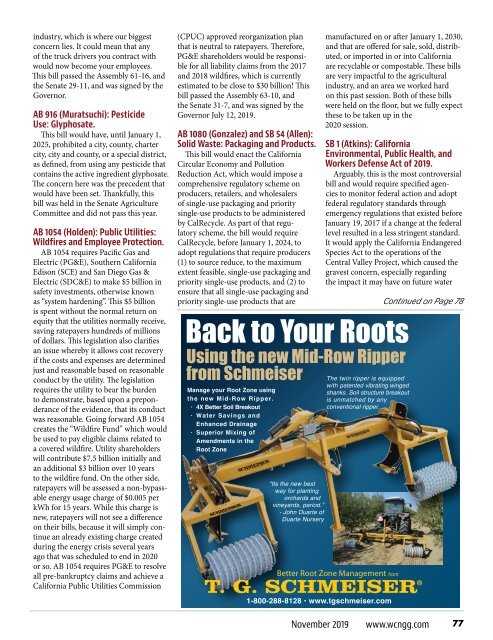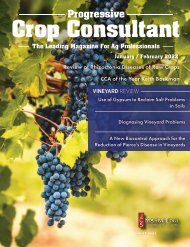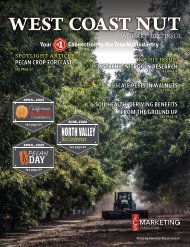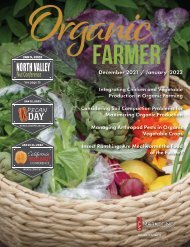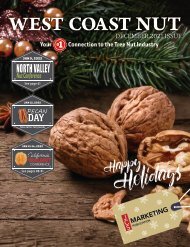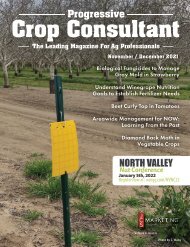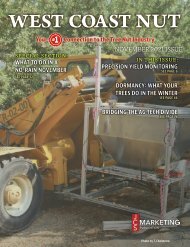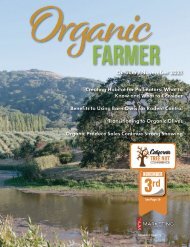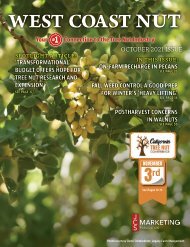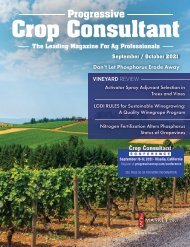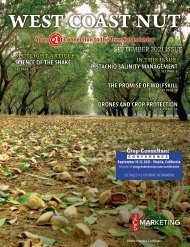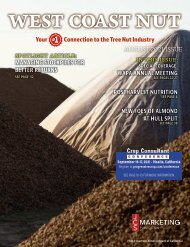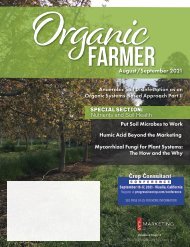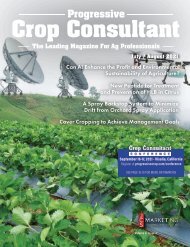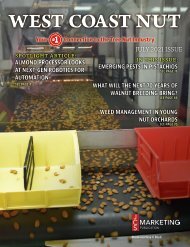You also want an ePaper? Increase the reach of your titles
YUMPU automatically turns print PDFs into web optimized ePapers that Google loves.
industry, which is where our biggest<br />
concern lies. It could mean that any<br />
of the truck drivers you contract with<br />
would now become your employees.<br />
This bill passed the Assembly 61-16, and<br />
the Senate 29-11, and was signed by the<br />
Governor.<br />
AB 916 (Muratsuchi): Pesticide<br />
Use: Glyphosate.<br />
This bill would have, until January 1,<br />
2025, prohibited a city, county, charter<br />
city, city and county, or a special district,<br />
as defined, from using any pesticide that<br />
contains the active ingredient glyphosate.<br />
The concern here was the precedent that<br />
would have been set. Thankfully, this<br />
bill was held in the Senate Agriculture<br />
Committee and did not pass this year.<br />
AB 1054 (Holden): Public Utilities:<br />
Wildfires and Employee Protection.<br />
AB 1054 requires Pacific Gas and<br />
Electric (PG&E), Southern California<br />
Edison (SCE) and San Diego Gas &<br />
Electric (SDC&E) to make $5 billion in<br />
safety investments, otherwise known<br />
as “system hardening”. This $5 billion<br />
is spent without the normal return on<br />
equity that the utilities normally receive,<br />
saving ratepayers hundreds of millions<br />
of dollars. This legislation also clarifies<br />
an issue whereby it allows cost recovery<br />
if the costs and expenses are determined<br />
just and reasonable based on reasonable<br />
conduct by the utility. The legislation<br />
requires the utility to bear the burden<br />
to demonstrate, based upon a preponderance<br />
of the evidence, that its conduct<br />
was reasonable. Going forward AB 1054<br />
creates the “Wildfire Fund” which would<br />
be used to pay eligible claims related to<br />
a covered wildfire. Utility shareholders<br />
will contribute $7.5 billion initially and<br />
an additional $3 billion over 10 years<br />
to the wildfire fund. On the other side,<br />
ratepayers will be assessed a non-bypassable<br />
energy usage charge of $0.005 per<br />
kWh for 15 years. While this charge is<br />
new, ratepayers will not see a difference<br />
on their bills, because it will simply continue<br />
an already existing charge created<br />
during the energy crisis several years<br />
ago that was scheduled to end in 2020<br />
or so. AB 1054 requires PG&E to resolve<br />
all pre-bankruptcy claims and achieve a<br />
California Public Utilities Commission<br />
(CPUC) approved reorganization plan<br />
that is neutral to ratepayers. Therefore,<br />
PG&E shareholders would be responsible<br />
for all liability claims from the 2017<br />
and 2018 wildfires, which is currently<br />
estimated to be close to $30 billion! This<br />
bill passed the Assembly 63-10, and<br />
the Senate 31-7, and was signed by the<br />
Governor July 12, <strong>2019</strong>.<br />
AB 1080 (Gonzalez) and SB 54 (Allen):<br />
Solid Waste: Packaging and Products. SB 1 (Atkins): California<br />
This bill would enact the California Environmental, Public Health, and<br />
Circular Economy and Pollution<br />
Workers Defense Act of <strong>2019</strong>.<br />
Reduction Act, which would impose a Arguably, this is the most controversial<br />
comprehensive regulatory scheme on bill and would require specified agencies<br />
to monitor federal action and adopt<br />
producers, retailers, and wholesalers<br />
of single-use packaging and priority federal regulatory standards through<br />
single-use products to be administered emergency regulations that existed before<br />
by CalRecycle. As part of that regulatory<br />
scheme, the bill would require level resulted in a less stringent standard.<br />
January 19, 2017 if a change at the federal<br />
CalRecycle, before January 1, 2024, to It would apply the California Endangered<br />
adopt regulations that require producers Species Act to the operations of the<br />
(1) to source reduce, to the maximum Central Valley Project, which caused the<br />
extent feasible, single-use packaging and gravest concern, especially regarding<br />
priority single-use products, and (2) to the impact it may have on future water<br />
ensure that all single-use packaging and<br />
priority single-use products that are Continued on Page 78<br />
Back to Your Roots<br />
Using the new Mid-Row Ripper<br />
from Schmeiser<br />
Manage your Root Zone using<br />
the new Mid-Row Ripper.<br />
· 4X Better Soil Breakout<br />
· Water Savings and<br />
Enhanced Drainage<br />
· Superior Mixing of<br />
Amendments in the<br />
Root Zone<br />
“Its the new best<br />
way for planting<br />
orchards and<br />
vineyards, period.”<br />
- John Duarte of<br />
Duarte Nursery<br />
The twin ripper is equipped<br />
with patented vibrating winged<br />
shanks. Soil structure breakout<br />
is unmatched by any<br />
conventional ripper.<br />
Better Root Zone Management from<br />
1-800-288-8128 • www.tgschmeiser.com<br />
manufactured on or after January 1, 2030,<br />
and that are offered for sale, sold, distributed,<br />
or imported in or into California<br />
are recyclable or compostable. These bills<br />
are very impactful to the agricultural<br />
industry, and an area we worked hard<br />
on this past session. Both of these bills<br />
were held on the floor, but we fully expect<br />
these to be taken up in the<br />
2020 session.<br />
<strong>November</strong> <strong>2019</strong><br />
www.wcngg.com<br />
77


